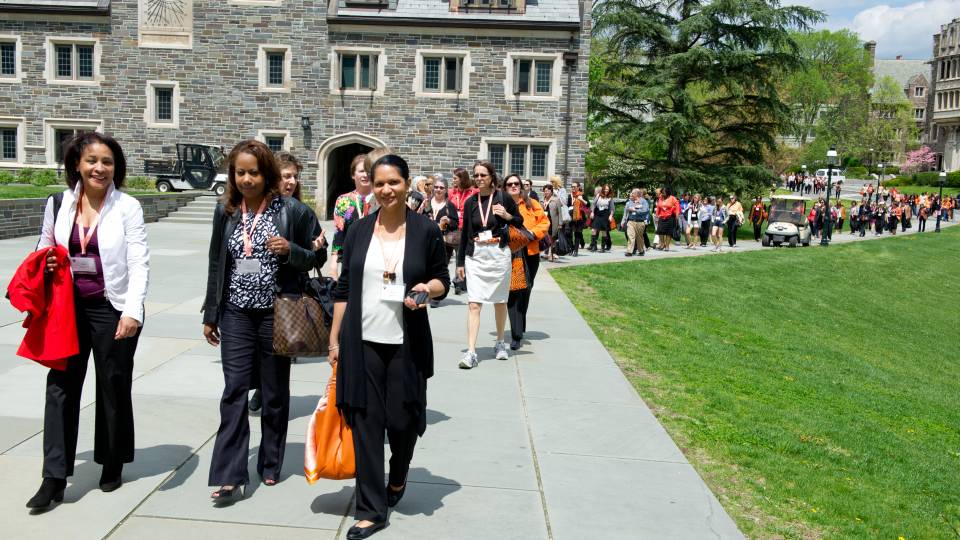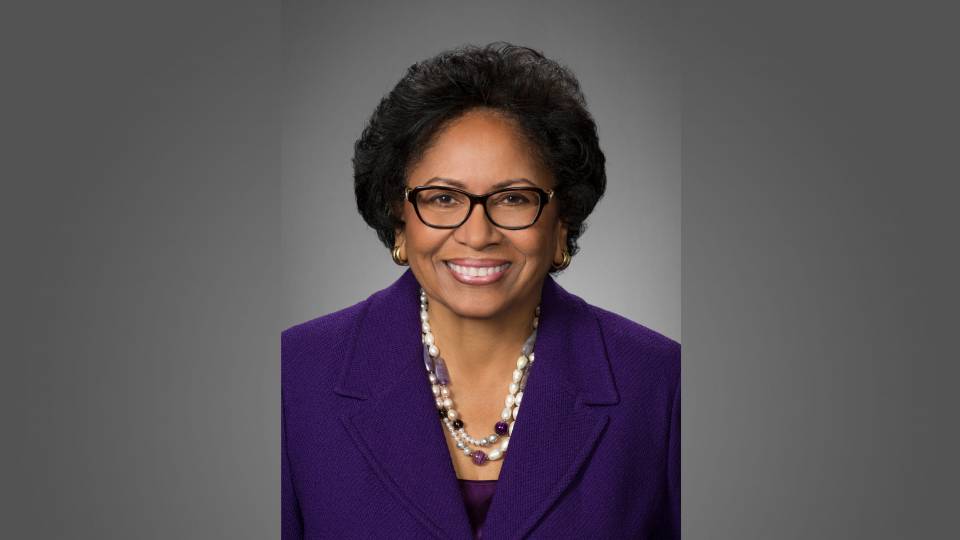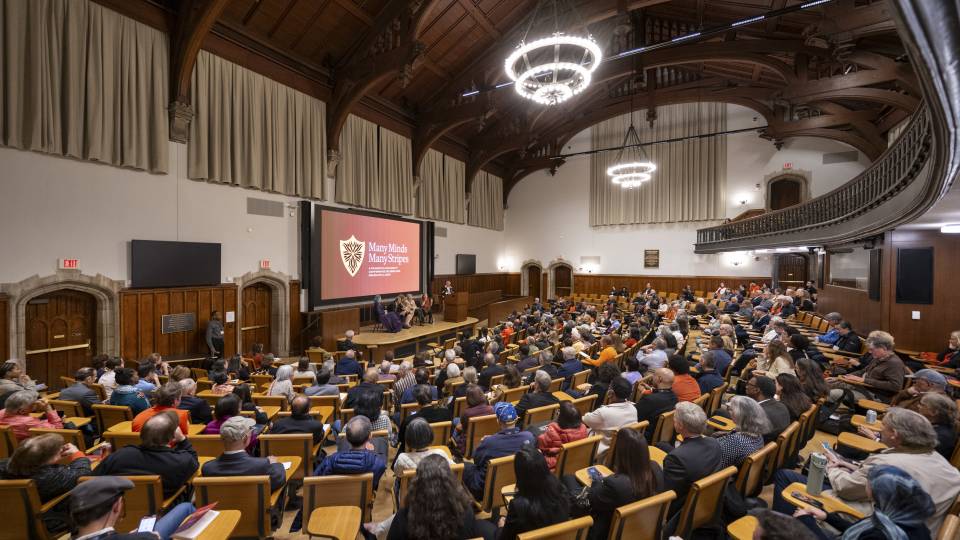Nearly 1,300 Princeton alumni and guests came to campus Thursday through Saturday, Oct. 3-5, 2019, for “Thrive: Empowering and Celebrating Princeton’s Black Alumni.” The gathering featured discussions with alumni, faculty and students, networking and social opportunities, entrepreneurship workshops, performing arts showcases, and many ways to celebrate the Princeton community.
More than 1,200 Princeton alumni and guests came to campus Thursday through Saturday, Oct. 3-5, for “Thrive: Empowering and Celebrating Princeton’s Black Alumni.” The gathering featured discussions with alumni, faculty and students, networking and social opportunities, performing arts showcases, entrepreneurship workshops and a startup showcase, and many ways to celebrate the Princeton community.

Former First Lady Michelle Obama, of Princeton’s Class of 1985, gives a video welcome message on Friday morning in a packed Richardson Auditorium.
In a video welcome message on Friday morning in a packed Richardson Auditorium, former First Lady Michelle Obama, a Princeton Class of 1985 graduate, said, “… If there's one thing that I've learned since I've left Princeton, it's this: No matter what direction you're headed, nobody gets there alone.
“We all need to help each other to sharpen our skills and soften our landings or jump-start a change for the better. That's how we can not only make progress for ourselves, but continue along the journey of discovering who we are, and that, to me, is what it means to thrive.”
The conference followed up on previous black alumni conferences in 2006, 2009 and 2014. Nearly 40% of attendees had not attended a past conference since graduating, attesting to the high level of engagement. Select “Thrive” highlights are described below.
President Eisgruber and Dean Richardson welcome alumni
In his welcome address, Princeton President Christopher L. Eisgruber, Class of 1983, updated alumni on what “Princeton is today and what we are trying to be tomorrow.” He pinpointed a range of University initiatives, including:
- The increasing diversity of the undergraduate and graduate student bodies. Twenty-four percent of first-years in the Class of 2023 are eligible for Pell grants for low-income students, while the Graduate School welcomed its most diverse class of incoming graduate students this fall.
- Plans to expand the undergraduate student body, as well as plans for the University’s physical expansion with the development of Lake Campus.
- Initiatives in engineering and environmental studies, including a new home for the Department of Computer Science and new facilities for the environmental sciences.
- The University’s cultivation of an innovation ecosystem in the region, including the new Google AI Lab in downtown Princeton.
- Efforts to diversify campus iconography and building names, such as the dedication of Morrison Hall (formerly West College) in honor of Nobel laureate Toni Morrison.
- Excellence in the creative and performing arts centered in the new Lewis Center complex.
- Initiatives to extend Princeton’s commitment to public service, such as the John C. Bogle ’51 Fellows in Civic Service.


President Christopher L. Eisgruber, Class of 1983, gives alumni an update on what “Princeton is today and what we are trying to be tomorrow.” He highlighted a range of University initiatives, including increasing the diversity of undergraduates and graduate students, the University’s generous financial aid program, and exciting innovations in engineering and environmental studies.
Dean of Admission Karen Richardson, Class of 1993, gives alumni a warm welcome. Richardson started in her new role at Princeton this summer.
Eisgruber also highlighted the University’s generous financial aid program, which enables Princeton students to graduate debt free. He noted no student is required to take out loans at Princeton; 83% of recent seniors graduated debt free; 61% of undergraduates receive financial aid; and the average financial aid grant is higher than the price of tuition.
Alumni also received a warm welcome from Dean of Admission Karen Richardson, Class of 1993, who started in her new role at Princeton this summer. Richardson said she was thrilled to come full circle at the University, from her undergraduate work study job in Admission to leading the office today.
Richardson recalled feeling unsure of herself as a 17-year-old arriving at Princeton as a first-generation college student.
“I attended a small high school in an even smaller town,” she said. “I came to Princeton and I realized this place was different. In some good ways and in some not good ways.”
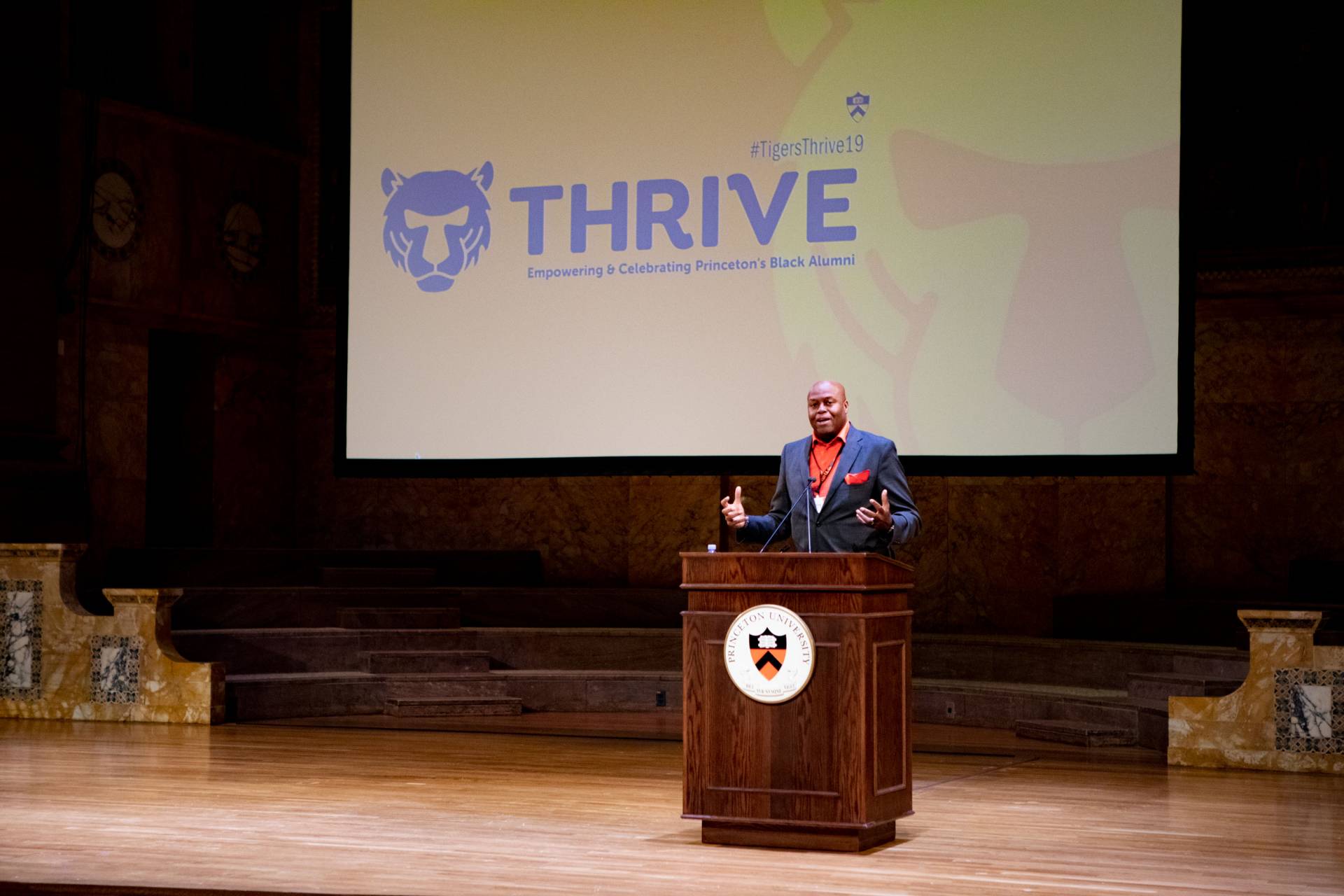
Craig Robinson, Class of 1983 and co-chair of the Thrive steering committee, introduces a surprise video message from his sister and former First Lady Michelle Obama, Class of 1985.
As a politics major in the early 1990s, Richardson said she was sometimes the only woman and often the only woman of color in a precept. She credited great mentors inside and outside the classroom with helping her realize her “voice did matter.”
“We can all probably point to a moment or moments when we thought ‘What am I doing here?’
"No doubt there are still students here asking those same questions today,” Richardson said. “I can attest to the high level of support from people on campus today. People who ensure that students feel welcome and included.”
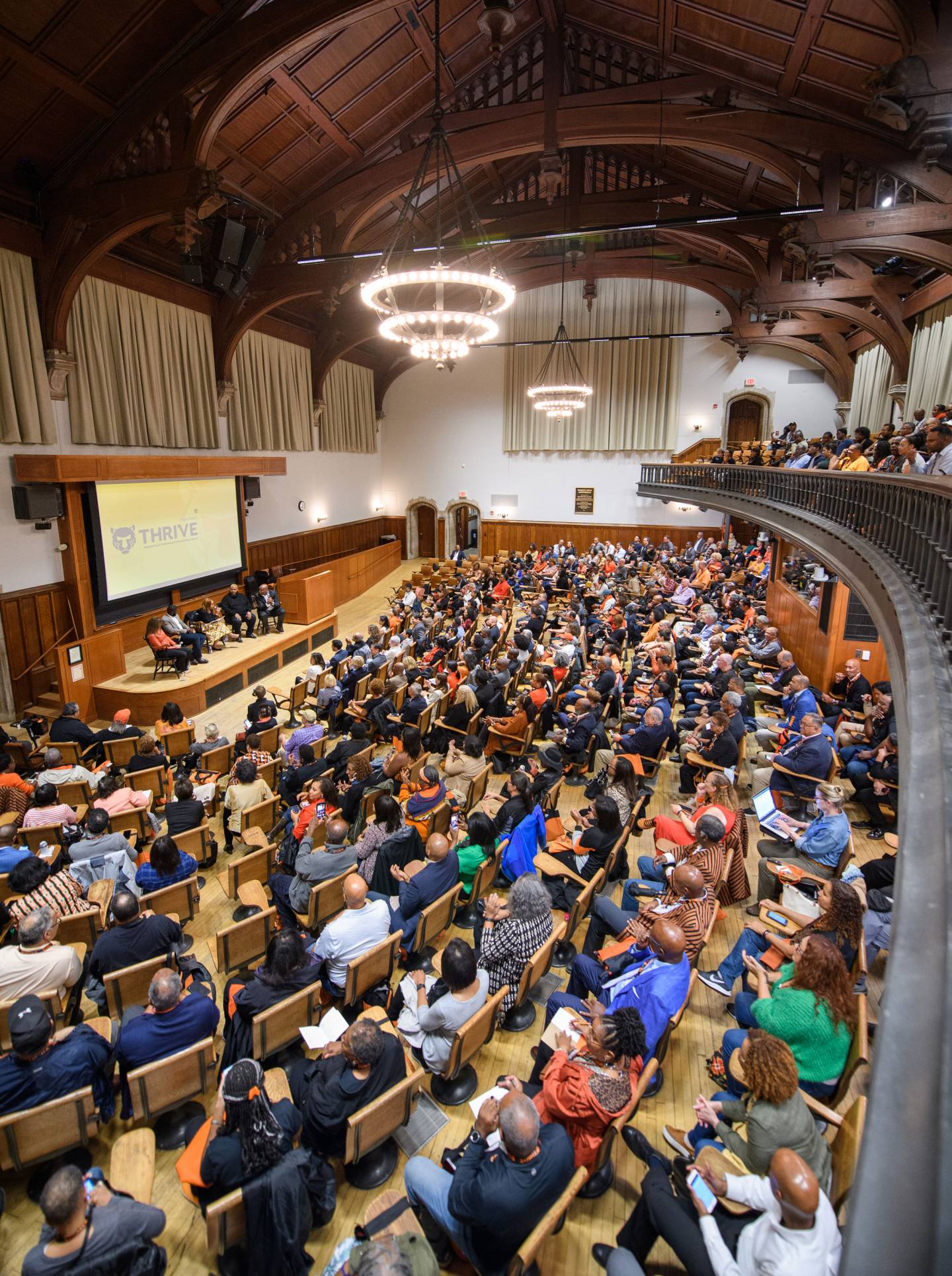
On the first evening of the conference, spirits were high and the energy was supercharged as alumni packed into McCosh 50 for a lively panel about “Journeys to, Through and Beyond Princeton,” featuring five members of the conference steering committee: Lori Dickerson, Class of 1992 (left); Fiyinfoluwa “Tumi” Akinlawon, Class of 2015 and former University trustee; Kim Goodwin, Class of 1981 and trustee; Michael Fletcher, Class of 2003; and Craig Robinson, Class of 1983 and trustee.
Finding many ways to ‘thrive’
On Thursday evening, spirits were high and the energy was supercharged as alumni filled McCosh 50 for the presentation “Our Journeys to, Through and Beyond Princeton: More than One Way to Thrive,” featuring five members of the conference steering committee.
Kim Goodwin, a 1981 graduate and trustee, and CEO and CIO of Avanico Holdings, asked each guest to share a story of someone significant who had helped them get to Princeton.
In a tongue-in-cheek reference to his sister, Michelle Obama, Craig Robinson, a 1983 graduate and University trustee, said with a grin, “I’m surprised you all don’t know the answer since my sister has been telling all of the family business.”
When the laughter subsided, Robinson, vice president of Player Development and G League Operations for the NBA’s New York Knicks, recalled his first days on campus, and said on a more serious note, “My parents were the ones who gave us the unconditional love, the empowerment, the freedom to be whoever we wanted to be.”
Lori Dickerson, a 1992 graduate and insurance executive, said her grandmother, who graduated from the University of Illinois during the Great Depression and picked dandelion greens and sold them to make ends meet, taught her “how precious education was.”
Summarizing Dickerson’s impressive professional history, Goodwin took a pause, then revealed that Dickerson has been named CEO of TIAA Financial Solutions — “and the second black woman in history to become CEO of a Fortune 500 company!” The audience leapt to their feet for a standing ovation.
Goodwin asked the speakers to share a tip for attendees during the conference.
Michael Fletcher, a 2003 graduate and director of talent acquisition at BRICK Education Network, encouraged attendees to “acknowledge this much larger community — we’re thriving. You’re an undergraduate for four years; you’re alumni for life.”
Fiyinfoluwa “Tumi” Akinlawon, a 2015 graduate, former University trustee, and native of Nigeria, recommended that younger alumni use the conference to forge relationships with mentors from older class years. “My most important mentors outside of my family, I found in this room. Look to this community, a lot of the older alumni are excited. So, connect!”
Princeton in the nation’s service
On Friday, alumni gathered for lunch under a tent on Poe Field for the discussion “In the Nation’s Service: Civic Engagement in the 21st Century.”
The event featured three alumni in service of city, county and state: Andrea Campbell, Class of 2004 and Boston City Council president; Satana Deberry, Class of 1991 and district attorney for Durham County in North Carolina; and Eric Johnson, mayor of Dallas and a 2003 master’s degree graduate from the Woodrow Wilson School of Public and International Affairs.
Dean of the Woodrow Wilson School Cecilia Rouse asked alumni about why they serve, the advantages of local government service, and any challenges they may face, particularly as black leaders during these times.
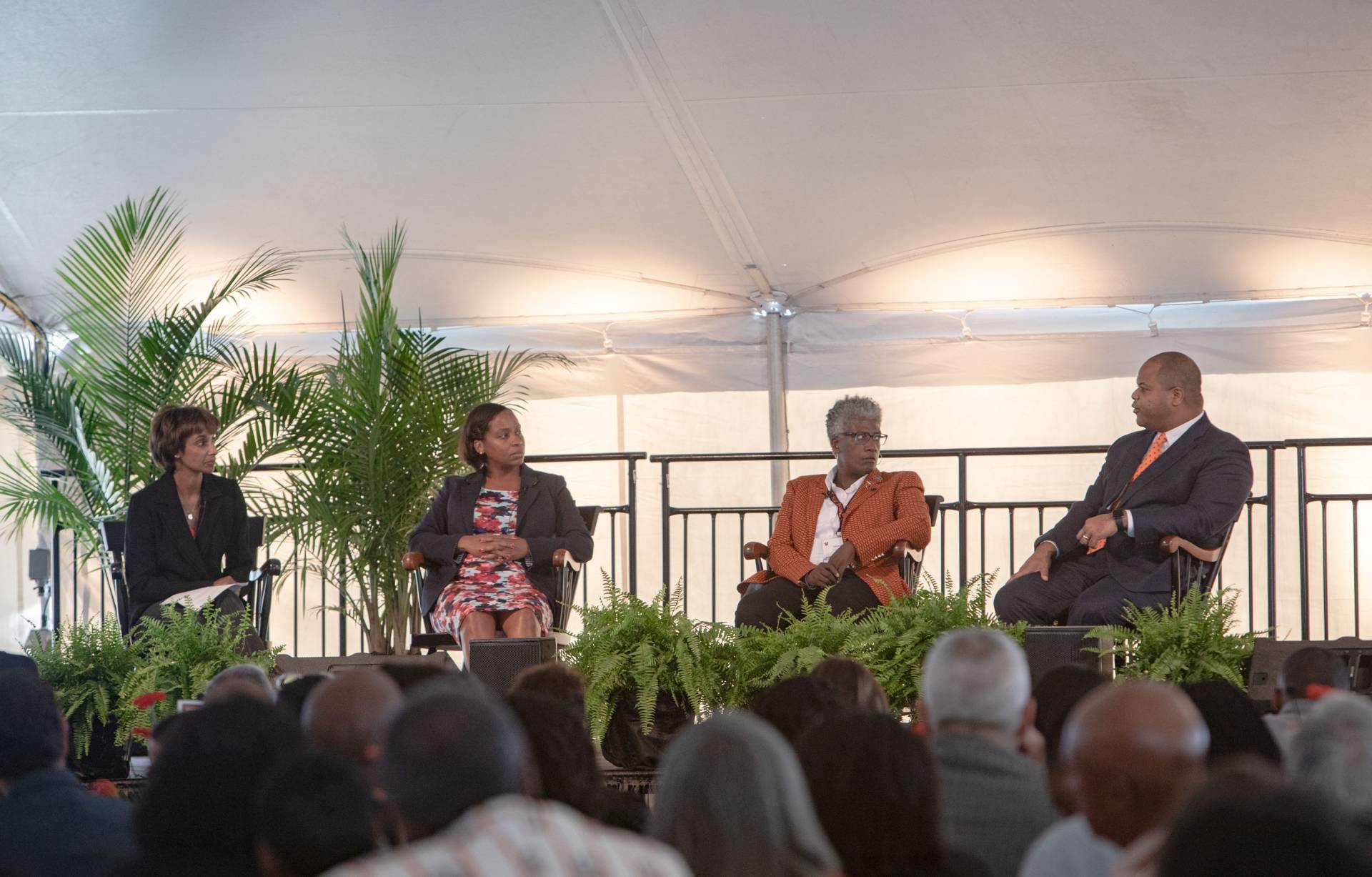
(From left to right) Cecilia Rouse, dean of the Woodrow Wilson School of Public and International Affairs, talks with Andrea Campbell, president of the Boston City Council; Satana Deberry, district attorney for Durham County, North Carolina; and Eric Johnson, mayor of Dallas. The panel featured undergraduate and graduate alumni serving in city, county and state governments.
Campbell said she approaches service through the lens of her own experience, noting that she’s the first black woman born and raised in Boston to serve on the city council and the first black woman to serve as council president.
“This tells me we still have so much more work to do,” she said. “Racism and sexism still exist in the city.” She said her aim is to dismantle government systems of inequality, and she is intent on improving opportunities for housing, education and work.
Johnson said he also focuses on equity issues in Dallas, including workforce development so that poorer residents can obtain higher-earning jobs.
“The southern part of Dallas where I grew up has always been a challenged area,” he said. “I’m working to address wealth gaps between the haves and have nots in our city.”
Deberry, a longtime defense attorney, said she ran for district attorney after realizing how much change she could effect from the other side of the legal system. She said her biggest concern is criminal justice reform.
“I spent 25 years representing poor people in communities of color,” she said. “There are lots of collateral consequences for having [any] criminal record.” She said a criminal conviction in someone’s past may mean they cannot get a job, join the military or even rent an apartment.
Deberry said she’s particularly proud of implementing a court fine forgiveness program in Durham County.
When asked how citizens could be more civically engaged, the public leaders offered practical ideas.
“Get involved in city and local community organizations,” Campbell said. “The best solutions come from residents on the ground.”
“Learn about your community,” Johnson said. “At a minimum, introduce yourself to local elected officials.”
“Run for office!” Deberry said. “You are all so smart. You all have more character and integrity than most people who run for office.”
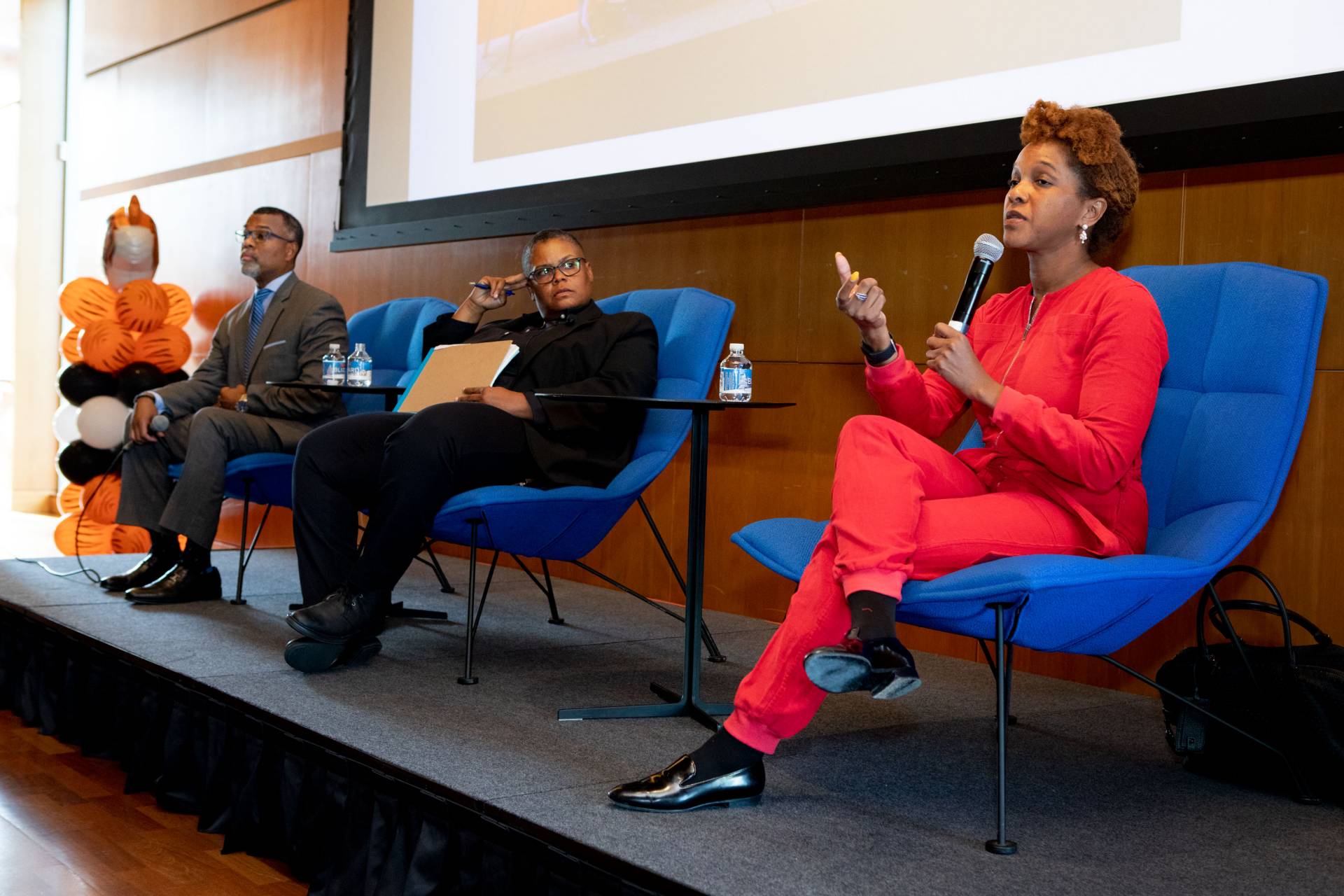
Imani Perry, the Hughes-Rogers Professor of African American Studies (right), discusses the history of the field of African American studies and its impact on society with colleagues Eddie Glaude Jr. (left), the James S. McDonnell Distinguished University Professor and chair of African American studies, and Keeanga-Yamahtta Taylor, assistant professor of African American studies.
Celebrating African American studies at Princeton
“I’m fond of saying I have the best colleagues on the planet!” said Eddie Glaude Jr., the James S. McDonnell Distinguished University Professor and chair of African American studies, as he greeted the capacity audience at “Looking Back, Moving Forward: 50 Years of African American Studies at Princeton and the 10th Anniversary of the Carl A. Fields Center.”
Two of those colleagues shared the stage with him: Imani Perry, the Hughes-Rogers Professor of African American Studies, and Keeanga-Yamahtta Taylor, assistant professor of African American studies.
Glaude, a 1997 graduate alumnus, asked them to share their thoughts on African American studies “in relation to the beginnings of the field.”
“I think we have figured out a balance between the early energy of understanding black studies having a direct relationship to the world and to the deep knowledge of where we are today,” Perry said. “We have dual energies of both speaking to dire conditions of this moment but also a kind of intensity of backlash that is taking us [back] to the worst periods of our history.”
Taylor emphasized the importance of having “an institutionalized space to talk about the lives of working-class black people not just as a field of study but for the purpose of actually being able to do something about it.”
Perry underscored the importance of academic rigor and the value of interdisciplinary studies. “The questions we want to answer do not have answers in a single field.” In caring about human beings, she said, “It’s a passion that’s focused on the real world.”

Ruth Simmons, president of Prairie View A&M University and former vice provost of Princeton (second from right) reflects on the most pressing issues college presidents face in an age of skepticism about the value of higher education, with Princeton President Christopher L. Eisgruber (left); Lily McNair, a 1979 graduate and president of Tuskegee University (second from left); and moderator Cecilia Rouse, dean of the Woodrow Wilson School and the Katzman-Ernst Professor in the Economics of Education.
From the top: College presidents reflect on the state of higher education
In the panel “Perspectives on Higher Education,” Eisgruber joined Lily McNair, Class of 1979 and president of Tuskegee University, and Ruth Simmons, president of Prairie View A&M University, in a candid discussion about some of the most pressing issues they face in their work.
Dean Cecilia Rouse, the moderator, who studies the economics of education, jumped right in. “While blacks are less skeptical than whites, they are still concerned about the direction of higher education,” she said. “What do you say to families that are skeptical about the value of a college education?”
“I cannot think of anything as important as an education, nothing compares with what it does for society, for what it does for individuals,” Simmons said. A former president of Smith College and Brown University, where she was the first African American president of an Ivy League institution, Simmons previously served in several administrative positions at Princeton, including vice provost, and is a former trustee.
McNair, the first woman president of Tuskegee, said, “We just have to show them the data: Employers want college-educated students who can communicate, work in diverse teams.”
Eisgruber said he quotes Rouse: “For most people, even after you take into account the cost of tuition, and yes, it’s expensive, the investment they make in education will be the best investment they make in their life. The return is 10% and that’s hard to beat.”
“How do we ensure a robust exchange of ideas so that students learn to hear, consider and debate thoughtfully ideas different from their own?” Rouse asked.
McNair said, “We focus on how important it is to have spirited arguments, dialogues with people who have different views.” Simmons said, “The truth is often uncomfortable. … We’re teaching our students to become comfortable with discomfort.”
Rouse also asked the presidents what other issues weigh on their minds. Eisgruber said he grapples with “the way cellphones and digital distractions are changing everything we do. We want students to be lost in thought on subjects that enthrall them … and now we’re dealing with a technology that constantly distracts and produces incendiary relationships.”
In a lively audience Q&A, the presidents responded to questions about how to attract graduate students; student debt; mental health; and college access, including funding public universities and colleges.

Princeton alumni show off their vibrant orange and black outfits while they reconnect with each other during the Thrive conference. From left to right are Kevin Dowdell, Class of 1983; Charmaine Lewis, Class of 1991; and Mike Barney, Class of 1983.
What is ‘personal philanthropy’?
Do you have to give money to be considered a philanthropist? How does philanthropy support your values? How do you choose which philanthropies to support? These were some of the questions addressed in the panel “Paying It Forward: Evolving Your Personal Philanthropy.”
Moderator Arielle Patrick, Class of 2012 who is senior vice president and transaction director at Edelman, asked the speakers to recall an early memory that set them on the path to philanthropy.
Laurence Latimer, a 2001 graduate alumnus and head of ventures at IEX Group, said his grandmother, who was a domestic worker, would gather clothing they had outgrown or didn’t need and even appliances, to ship to their extended family in Jamaica.
Kwanza Jones of the Class of 1993, artist, and founder and CEO of the Kwanza Jones & José E. Feliciano SUPERCHARGED Initiative, said her father, who grew up during the Great Depression, instilled in his children that “it is absolutely necessary to always give.”
Patrick elicited advice for forging a philanthropic path.
Laurence Morse, a 1980 graduate alumnus, co-founder and managing partner of Fairview Capital Partners, Inc., and former University trustee and board member of the Princeton University Investment Company (PRINCO), said: “Be very intentional. It’s not always about how many dollars you give, it’s how much you give of your time and expertise.”
Morse, who received full funding to attend Howard University and Princeton, said, “I start from a place of gratitude; there was no way in the world I wasn’t going to find a way to give back.” Education runs through all of his philanthropic commitments. “When we look at all the problems in the world, we need well-trained, well-educated people, which guarantees there will be creative knowledge,” he said.
Kimberly Johnson, a 1995 graduate and EVP and COO of Fannie Mae, spoke about why she gives to Princeton. “When I look at this University, it is so different than the days I was here. That doesn’t happen by itself. I think we’re doing a huge service to black students to come.”
Jones underscored that lots of small donations add up to big impact. “Please do not underestimate the power that all of us collectively have,” she said. “Black donorship makes a difference; where’s there’s people of color, show up, not just for us and our legacies, for other people, so they see. They don’t understand what value we bring, what power we have!”

At the closing dinner, University trustee and U.S. Rep. Terri Sewell, Class of 1986, left, speaks to fellow trustee Melanie Lawson, Class of 1976, a journalist for WTRK-TV in Houston.
Stronger together
At the closing dinner, University trustee and U.S. Rep. Terri Sewell reflected on the many ways Princeton — most importantly its people — have helped her thrive.
“Eighteen-year-old Terri would never have imagined that years later she would be sitting here as a member of Congress from Alabama’s Seventh District,” said Sewell, a member of the Class of 1986, to cheers at the Poe Field tent. “She is sitting here because of a network that is known as Princeton University.”
Sewell was interviewed onstage by fellow trustee Melanie Lawson, Class of 1976, a journalist for WTRK-TV in Houston.
Sewell, who is in her fifth term, is one of the first women elected to Congress from Alabama and the first black woman to serve in the Alabama congressional delegation.
Sewell said the word “thrive” is the way the “heart restores its vital energy,” and that she enjoyed reconnecting, reengaging and reenergizing herself over the three days of the conference.

Class of 1977 member William Massey, the Edwin S. Wilsey Professor of Operations Research and Financial Engineering, speaks on the topic of "Inclusive Excellence for Science, Technology, Engineering and Mathematics."
“Princeton is a source of great energy,” she said. “No matter what your journey was here at Princeton University, we have a shared experience that collectively makes us stronger.”
The support Sewell received over the years began from the time of her recruitment to Princeton. Julian McPhillips, Class of 1961, a civil rights attorney in Montgomery, Alabama, asked her and her parents to visit him after reading an article about Sewell’s high school debate performance in the Montgomery Advertiser.
Sewell also acknowledged the impact of her “big sister” at the Third World Center (now the Fields Center), future First Lady Michelle Obama (then Michelle Robinson), among other classmates, as well as the support of former University President William G. Bowen, whom she met as an undergraduate and who remembered her years later when she ran for office.
“One of the reasons I thrived here was because Princeton affirmatively went looking for diversity for its student body,” she said. “They took a chance on a little black girl from Selma, Alabama, but they gave me the opportunity. What I did with that opportunity was on me. And what I love about Princeton is that Princeton gives you the resources, if you take advantage of them, to literally change your life.”
Inclusive excellence
In a discussion on “Inclusive Excellence for Science, Technology, Engineering and Mathematics,” professors William Massey and Rodney Priestley celebrated the success of Princeton’s black alumni in technical fields and outlined current efforts to enhance diversity among graduate students and faculty.
In introducing the speakers, 1970 alumnus Charles “Steve” Dawson noted that Massey, of the Class of 1977, was the first African American undergraduate alumnus to return to Princeton as a full professor. Massey himself has chronicled the history of black scholars at Princeton engineering dating to the 1960s, when Wesley Harris became the first African American to receive a Ph.D. in engineering from Princeton. Harris is now the C.S. Draper Professor of Aeronautics and Astronautics at the Massachusetts Institute of Technology.
Massey, the Edwin S. Wilsey Professor of Operations Research and Financial Engineering, credited Bell Laboratories’ Cooperative Research Fellowship Program with enabling a generation of minority students and women to pursue Ph.D. degrees at Princeton and elsewhere in the 1970s and 1980s. Sharing photos and stories of students he has mentored, Massey emphasized the strong community and professional network of the Wesley L. Harris Scientific Society, a Princeton graduate student organization that he co-founded to support scientists and engineers from underrepresented groups.
Priestley, a professor of chemical and biological engineering and Princeton’s vice dean for innovation, acknowledged that the number of students and faculty from underrepresented groups must be improved and highlighted efforts at the engineering school and Graduate School to recruit more actively. He described new programs such as the engineering school’s Pathways to Graduate School for Rising College Seniors, an on-campus opportunity for networking and application support; and the Graduate School’s Pre-Doctoral Fellowship Initiative, which provides additional training to help students from diverse backgrounds succeed in Princeton Ph.D. programs. — By Molly Sharlach, Office of Engineering Communications

The Jazz Vocal Collective featuring singer Danielle Stephenson, Class of 2020, performs in Richardson Auditorium at one of the conference's many arts offerings.



